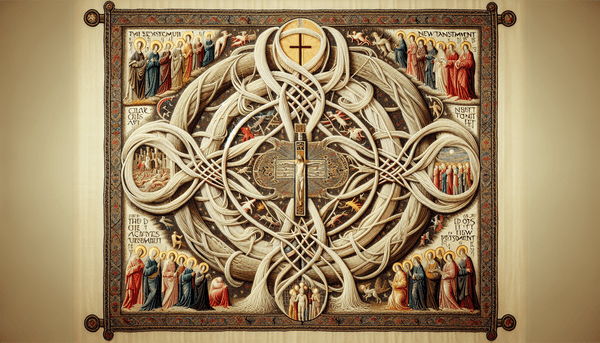The Division of Jesus' Garments
The act of casting lots for Jesus' garments by the soldiers is a scene painted with the colors of prophecy from the Old Testament. David, in a moment of despair reflected in Psalm 22:18, laments that his enemies divided his clothes among them and cast lots for his garment. This poignant image finds its fulfillment at the foot of the cross, as described in John 19:24, where the soldiers unknowingly complete the tableau foretold in the Psalms. This event not only underscores the messianic role of Jesus but also validates the divine inspiration of the Scriptures as seen in the Gospel of Matthew (Matthew 27:35). The early Christian community would have seen in these actions a powerful confirmation of Jesus' identity and mission, as He explains later to His disciples the necessity of all things written about Him in the Law of Moses, the Prophets, and the Psalms to be fulfilled (Luke 24:44).
Sharing the Gospel and Preaching
Mark 16:15 records Jesus' commission to His followers to 'go into all the world and preach the gospel to all creation,' highlighting the centrality of evangelism in Christian life. This command reinforces the responsibility and privilege that believers have in sharing the good news of Jesus Christ. Preaching and teaching are not confined to the pulpit; they are a calling for every Christian, manifesting in diverse methods and opportunities. Understanding the significance of God's name, Yahweh, revealed to Moses, brings depth to this calling. It is a reflection of God's eternal nature and His relationship with His people. The sacredness of God's name and the power it holds is a reminder of the message that Christians are entrusted to share, as they make disciples of all nations (Matthew 28:19-20) and rely on the empowerment of the Holy Spirit (Acts 1:8).
Conclusion
As we have explored, the prophecies of the Old Testament and their fulfillment in the life of Jesus Christ form a narrative that is both complex and beautiful. The events of Jesus' trial and crucifixion, including the inscription on the cross and the division of His garments, are more than historical occurrences; they are divine brushstrokes on the canvas of redemption. The Psalms, with their timeless expressions of trust in God, continue to offer solace and strength to believers today. The fulfillment of these prophecies and the role of the Psalms underscore the importance of Scripture in the life of a Christian and the mandate to share the Gospel message. Let this reflection on Scripture's continuity inspire us to delve deeper into its truth and extend the invitation of salvation to those around us.
FAQ
Q: How is Jesus being named as the King of Jews a fulfillment of prophecy?
A: Jesus being named as the King of the Jews fulfills Old Testament prophecies, particularly in Isaiah 9:6-7 and Isaiah 11:1-5, which foretell the birth of a king who will reign with justice and righteousness. The inscription 'The King of the Jews' on the cross affirms these prophecies and acknowledges Jesus as the long-awaited monarch of God's people.
Q: What does John 19:21-22 mean?
A: John 19:21-22 describes the interaction between Pilate and the Jewish religious leaders who wanted the inscription on Jesus' cross to indicate that He claimed to be the King of the Jews. Pilate's response, 'What I have written, I have written,' shows his final decision to label Jesus as 'The King of the Jews,' causing tension between religious and political authorities.
Q: What does John 19:24 mean?
A: John 19:24 refers to the soldiers casting lots for Jesus' clothing, specifically His seamless tunic, as a fulfillment of the prophecy in Psalm 22:18. This act demonstrates how the crucifixion events were in accordance with Scripture.
Q: What is the significance of Psalm 23 in Christian faith?
A: Psalm 23 is significant in Christian faith as it portrays God as a caring shepherd who provides, guides, and protects His people. It encapsulates the trust and comfort believers find in their relationship with God, affirming His presence in all circumstances.





